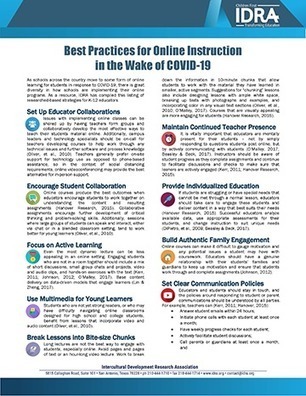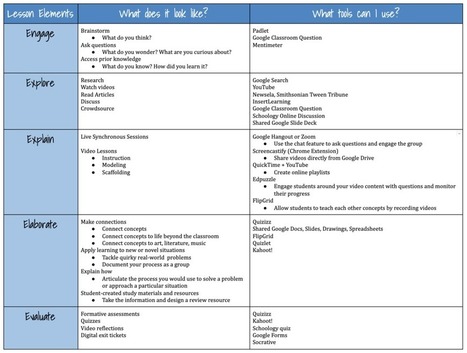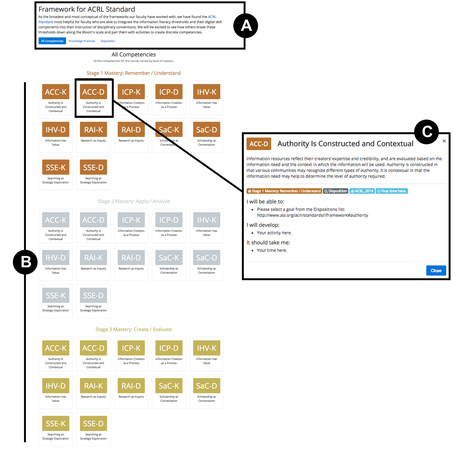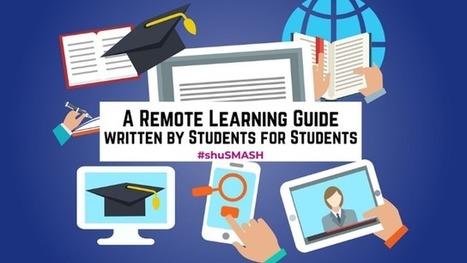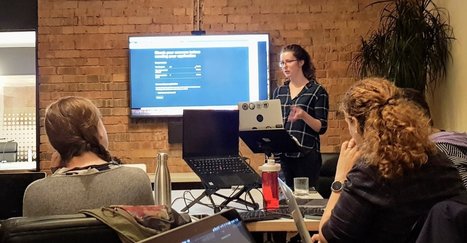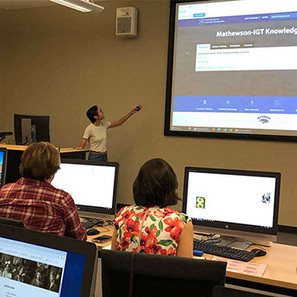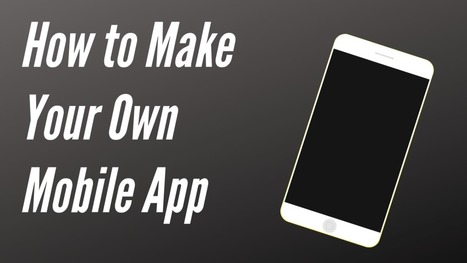 Your new post is loading...
 Your new post is loading...
Learning remotely and online can present new challenges, or just put a strain on your existing learning strategies. You might be finding that you’re being provided with a lot of learning materials such as powerpoint slides, video, readings or handouts. What do you do with all this material, and how can you make sure you’re learning effectively rather than just staring at your screen, with nothing really going in?
Listen to Helen, one of our tutors, suggesting a few strategies to ensure that you’re actively engaging with learning materials and getting the most out of them.
Via Elizabeth E Charles
As schools across the country move to some form of online learning for students in response to COVID-19, there is great diversity in how schools are implementing their online programs. As a resource, IDRA has compiled this listing of researched-based strategies for K-12 educators.
Via Elizabeth E Charles
Picture this: You’re driving around in Boston at rush hour on one of the notorious old carriage roads that seemingly twist without reason. You’re searching for a particular street downtown. The kids in the back seat are singing, as loud as they can, along with The Wiggles, which is blasting through the car speakers. I can’t handle it. What would make this better? Silence. My brain can’t process all of this at once. I’ve maxed out my cognitive load.
Via Elizabeth E Charles
Covid 19 has educators and educational institutions worried about and preparing for possible school closures. What happens if students have to stay home for days or even weeks? How can we keep them learning remotely? What strategies and technology tools
Via EDTECH@UTRGV, Elizabeth E Charles
There are so many useful skills you’ll develop while doing your research – from critical thinking and being able to evaluate your work and that of others, to time management skills. But the research world is rapidly changing, so what skills can you develop now to make you ready for the research future? In this post we guide you through some of the key skills for researchers today.
Via Elizabeth E Charles
Virginia Wesleyan University (VWU) is ranked 19th in ethnic diversity among national liberal arts colleges by U.S. News & World Report, a distinction held high by the institution. Diversity is a prominent feature of VWU’s strategic plan, and the institution’s core values emphasize inclusion and social responsibility. Given the diverse constituents on campus, librarians at VWU’s Hofheimer Library saw an opportunity to develop library diversity initiatives in an intentional way. What’s more, diversity forms an important component of the library’s strategic plan, thus emphasizing a commitment inclusive of the community being served.
Via Elizabeth E Charles
Framing questions the right way—and scaffolding the right kinds of responses—can help teachers avoid blank stares and awkward silences. What do you do when your question is met with blank stares? In “When You Get Nothing But Crickets,” Jennifer Gonzalez of Cult of Pedagogy shares a few ways to avoid those long, awkward silences after you pose a question.
Via Elizabeth E Charles
"In this article, we’ll discuss how retrieval-based learning can be used in digital learning programs to make them effective and sticky."
Via EDTECH@UTRGV, Elizabeth E Charles
LibParlor Contributor, Allison Hosier, discusses how writing an abstract first can help clarify what you’re currently talking about.
Allison Hosier is an given information Literacy Librarian during the University at Albany, SUNY. She has published and presented on research related to practical applications of the ACRL Framework for Information Literacy as part of information literacy instruction. Her research that is current is on examining the metaconcept that scientific studies are both an action and a topic of study. Follow her on Twitter at @ahosier.
In 2012, I attended a few workshops for brand new faculty on how to write very first peer-reviewed article, step-by-step. These workshops were loosely based on Writing Your Journal Article in 12 Weeks by Wendy Laura Belcher.
Our first assignment? Write the abstract for the article.
Via Elizabeth E Charles
Talking to children in clear, age-appropriate language about the dangers of the internet can be tricky. Fortunately, Google has a free (and pretty fantastic) toolkit you can use to discuss the fundamentals with your kids. In 2017, Google launched an internet literacy program called Be Internet Awesome. It’s aimed at elementary-to-middle-school-aged children but is also accessible to those a little younger or older than that. Recently, after a slew of feedback from parents and educators, Google updated the program, which makes this an even better time to take a look if you haven’t already.
Via Elizabeth E Charles
I said I’d share some recommendations for plugins and themes for a friend who is setting up his own blog (there was *definitely* no alcohol or coercion involved in this decision making, just to be clear) and so it seems sensible to do that by blogging here, because hopefully a few others might chip in on top with some extras that they find useful and I might learn something new too if the pro-social web really is alive and kicking…. Some thoughts in no particular order on how I set up my own site here and some of the tools I use to manage it for various purposes:
Via Elizabeth E Charles
The Digital Literacy Competency Calculator (DLCC) is a web-based tool for representing the connection between digital literacy competencies and the teaching and learning practices that produce them.
For more information, read our White Paper.
Via Elizabeth E Charles
Start writing, no matter what. The water does not flow until the faucet is turned on.”
— Louis L’Amour
When I first heard the instruction to write every day, I felt stress. I wasn’t sure what on earth I could possibly have to say that would need me to be saying it daily. As time went on and I learned more, got more conscious of success and developed my business mindset, I started finding it impossible to not write daily. Whether I’m working on an ebook or fiction, a blog post, status update or business journal entry, I am now always recording something. So, how can you implement this in your life as a content creator, especially if you are just starting out? Read on to find out.
Via Elizabeth E Charles
|
This is a second guest post written for students by students Matty Trueman, Kai Ackroyd, Curtis Alexis-Jones, Gagan Warinch and Eimantus Lukocius. We are final year students at Sheffield Hallam University. Intro The way students learn remotely is becoming more and more important as universities transition to online teaching. With many students facing a number… The way students learn remotely is becoming more and more important as universities transition to online teaching. With many students facing a number of challenges during this current time, it’s important that there are answers to some of the questions that might have arisen. This blog post aims to provide an informative guide on how students can improve their remote learning experience, with the following questions being answered: how to stay motivated, how are other students learning, how to support your peers and how to be more social.
Via Elizabeth E Charles
Social distancing. Stay-in ordinances. Home schooling. Experiences many of us never thought we would be living at the beginning of 2020. Now, the “new normal,” at least for the near future, involves students of all ages at home all day and parents trying to move their work to a virtual format. Managing the stress of change is a lot, but trying to do it while entertaining a kindergartner or overseeing a high-schooler’s online activities is enough to ramp up anyone’s stress level.
Via Elizabeth E Charles
We’ll all be teaching infolit online for the foreseeable future (I hope) and it is, as anyone who’s done much of it will tell you, a very different experience to being in a room with people.
I do a lot of training online already for overseas audiences, so I have some familiarity with this. For what it’s worth, here are some tips for retooling your sessions to work in a webinar type environment.
Via Elizabeth E Charles
Over the last week I've received a bunch of emails and Tweets from people looking for my suggestions on tools and tactics for teaching online if schools are closed due to COVID-19. I'm going to start this post with some tips for giving online instruction then get into some recommended tools.
Via Elizabeth E Charles
I’ve recently been working on a six month accessibility project at the Ministry of Justice. This has involved dealing with a lot of different things but one of the main outputs has been some accessibility testing training I’ve created.
After a lot of testing and iteration, this is now open for anyone to use! If you’d like to know more about how it was created, read the whole blog post, but if you just want to get stuck in, go straight to the ‘Try it out for yourself’ section.
Via Elizabeth E Charles
Prominent scholars say that to produce deeper learning, students need to become accustomed to confusion—and develop the persistence to find their own answers.
By Emily Kaplan
December 11, 2019
A few years ago, a little boy asked me when the world had become colorful.
I asked him what he meant.
Well, he said, anyone can see that when you look around now, everything has color. But in the old days, everything used to be in black and white. So what year did all the colors come?
Via Elizabeth E Charles
Why is content curation so relevant for learning? Because the best way to learn something is not by memorizing facts, formulas, numbers or dates as we are taught since elementary school. The best way to learn anything is by diving into it.
Via Elizabeth E Charles
Creating a successful learning experience is at the heart of instructional design and delivery. “In addition to academic instruction, one of a classroom’s teachers most important roles is to help students develop the critical thinking, collaboration, and self-reflection skills necessary to foster a better society” (Blacke, 2015, para. 1). Encouraging students to explore the topics of power and privilege resulting from social classifications and their impact on the thoughts and actions of themselves and others is an important step toward encouraging social justice. However, creating a classroom environment that facilitates and supports discussions about sensitive topics can be challenging.
Via Elizabeth E Charles
What would happen if your boss asked you to get information and the information you came back with wasn’t credible? This is a situation many students may find themselves in if they lack the skills they need to decipher between credible sources and “fake news.” For example, sources found through a Google search aren’t always trustworthy. Using or providing sources that aren’t credible could result in very serious consequences.
Via Elizabeth E Charles
"Reducing cognitive load can make all the difference when designing great digital learning content. But, given the fact that most of us don’t have a degree in psychology, what exactly does cognitive load mean, and how can it be reduced?"
Via EDTECH@UTRGV, Elizabeth E Charles
Glide is a free tool for making your own mobile apps. It’s a tool that has quickly risen to the top of my list of favorite tools for teachers and students. It’s a tool that we’ll spend time using during the Practical Ed Tech Summer Camp. With Glide anyone who can make a spreadsheet in Google Sheets can make his or her own mobile app.
Via Elizabeth E Charles
Picture this: It’s Monday and Ms. D’Angelo, a seventh-grade science teacher in the South Bronx, gives her students a homework assignment about food chains that is due in one week. The assignment asks students to teach a family member about this concept by completing a model food chain together. The following Monday, Ms. D’Angelo is surprised to see that that some of her students seem to understand the material at a deep level—they even use new vocabulary terms with great fluidity. These same students appear be much more confident than usual when engaging in the class discussion. Ms. D’Angelo scans her grade book and notices that these students are the same the ones who completed the homework assignment.
Via Elizabeth E Charles
|



 Your new post is loading...
Your new post is loading...



